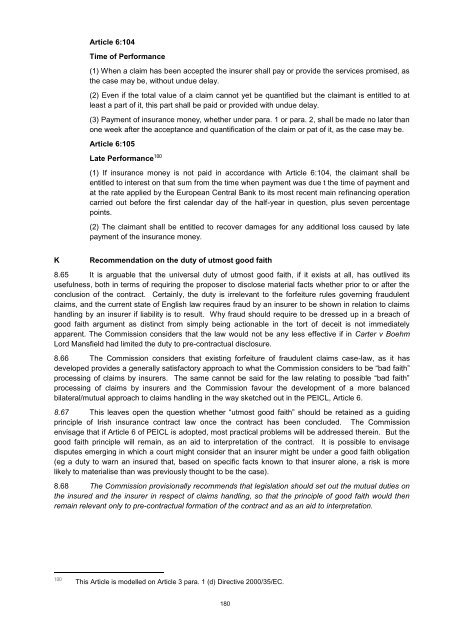Insurance Contracts CP - Law Reform Commission
Insurance Contracts CP - Law Reform Commission
Insurance Contracts CP - Law Reform Commission
Create successful ePaper yourself
Turn your PDF publications into a flip-book with our unique Google optimized e-Paper software.
Article 6:104<br />
Time of Performance<br />
(1) When a claim has been accepted the insurer shall pay or provide the services promised, as<br />
the case may be, without undue delay.<br />
(2) Even if the total value of a claim cannot yet be quantified but the claimant is entitled to at<br />
least a part of it, this part shall be paid or provided with undue delay.<br />
(3) Payment of insurance money, whether under para. 1 or para. 2, shall be made no later than<br />
one week after the acceptance and quantification of the claim or pat of it, as the case may be.<br />
Article 6:105<br />
Late Performance 100<br />
(1) If insurance money is not paid in accordance with Article 6:104, the claimant shall be<br />
entitled to interest on that sum from the time when payment was due t the time of payment and<br />
at the rate applied by the European Central Bank to its most recent main refinancing operation<br />
carried out before the first calendar day of the half-year in question, plus seven percentage<br />
points.<br />
(2) The claimant shall be entitled to recover damages for any additional loss caused by late<br />
payment of the insurance money.<br />
K<br />
Recommendation on the duty of utmost good faith<br />
8.65 It is arguable that the universal duty of utmost good faith, if it exists at all, has outlived its<br />
usefulness, both in terms of requiring the proposer to disclose material facts whether prior to or after the<br />
conclusion of the contract. Certainly, the duty is irrelevant to the forfeiture rules governing fraudulent<br />
claims, and the current state of English law requires fraud by an insurer to be shown in relation to claims<br />
handling by an insurer if liability is to result. Why fraud should require to be dressed up in a breach of<br />
good faith argument as distinct from simply being actionable in the tort of deceit is not immediately<br />
apparent. The <strong>Commission</strong> considers that the law would not be any less effective if in Carter v Boehm<br />
Lord Mansfield had limited the duty to pre-contractual disclosure.<br />
8.66 The <strong>Commission</strong> considers that existing forfeiture of fraudulent claims case-law, as it has<br />
developed provides a generally satisfactory approach to what the <strong>Commission</strong> considers to be ―bad faith‖<br />
processing of claims by insurers. The same cannot be said for the law relating to possible ―bad faith‖<br />
processing of claims by insurers and the <strong>Commission</strong> favour the development of a more balanced<br />
bilateral/mutual approach to claims handling in the way sketched out in the PEICL, Article 6.<br />
8.67 This leaves open the question whether ―utmost good faith‖ should be retained as a guiding<br />
principle of Irish insurance contract law once the contract has been concluded. The <strong>Commission</strong><br />
envisage that if Article 6 of PEICL is adopted, most practical problems will be addressed therein. But the<br />
good faith principle will remain, as an aid to interpretation of the contract. It is possible to envisage<br />
disputes emerging in which a court might consider that an insurer might be under a good faith obligation<br />
(eg a duty to warn an insured that, based on specific facts known to that insurer alone, a risk is more<br />
likely to materialise than was previously thought to be the case).<br />
8.68 The <strong>Commission</strong> provisionally recommends that legislation should set out the mutual duties on<br />
the insured and the insurer in respect of claims handling, so that the principle of good faith would then<br />
remain relevant only to pre-contractual formation of the contract and as an aid to interpretation.<br />
100<br />
This Article is modelled on Article 3 para. 1 (d) Directive 2000/35/EC.<br />
180

















